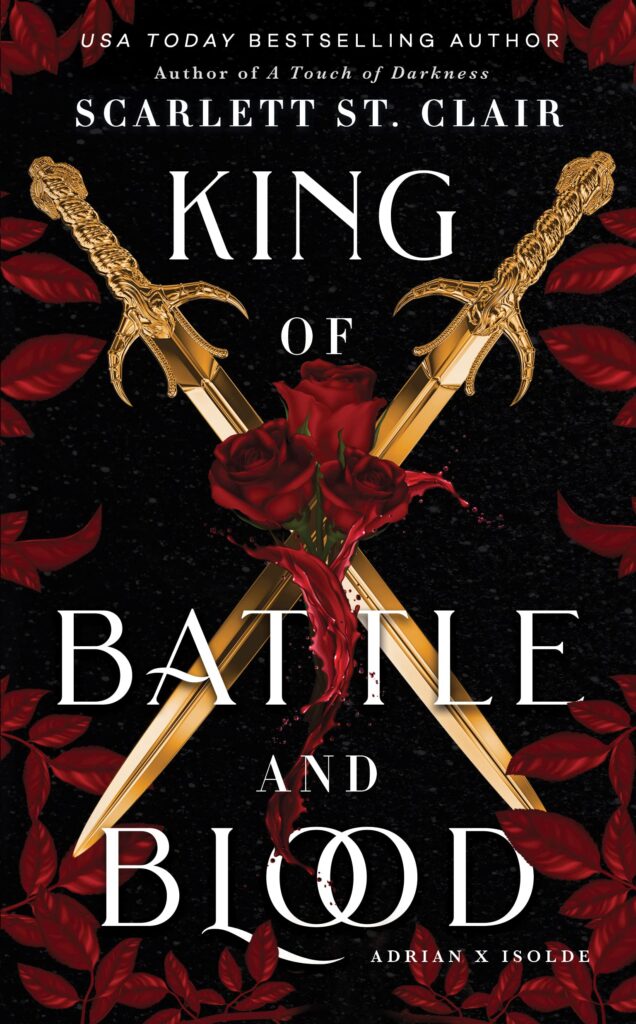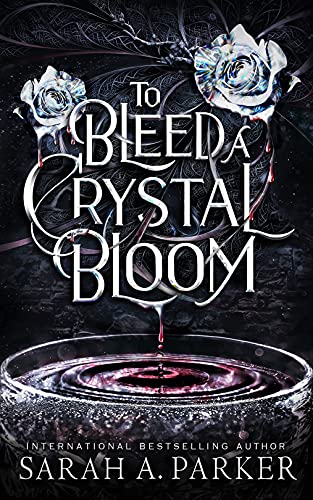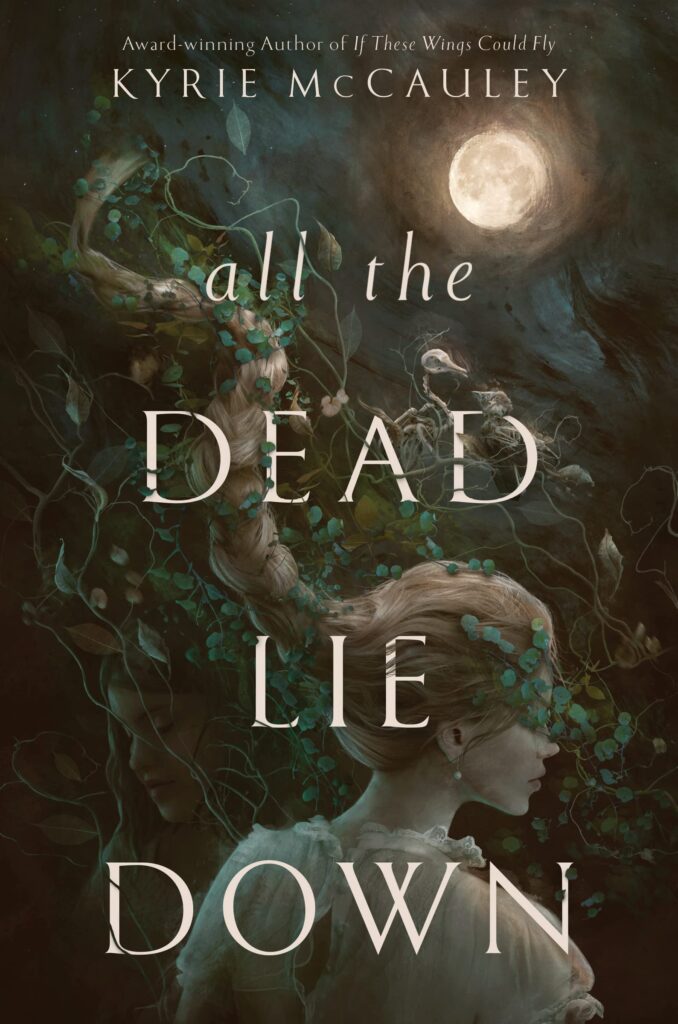
Their union is his revenge.
Isolde de Lara considers her wedding day to be her death day. To end a years-long war, she is to marry vampire king Adrian Aleksandr Vasiliev, and kill him.
But her assassination attempt is thwarted, and Adrian threatens that if Isolde tries to kill him again, he will raise her as the undead. Faced with the possibility of becoming the thing she hates most, Isolde seeks other ways to defy him and survive the brutal vampire court.
Except it isn’t the court she fears most – it’s Adrian. Despite their undeniable chemistry, she wonders why the king – fierce, savage, merciless – chose her as consort.
The answer will shatter her world.
Introduction
This isn’t my initial encounter with a Scarlett St. Clair book. I was previously introduced to the author through A Touch of Darkness a Hades and Persephone retelling. While I wouldn’t say I had strong negative feelings about it, I also didn’t fall head over heels for it. Truth be told, I never managed to reach the series’ conclusion, a circumstance perpetuated by my ever-expanding to-be-read list. Yet, when scrolling Goodreads and seeing the author was embarking upon the realm of vampires, a thought along the lines of “Oh, this could be good” flitted through my mind. Armed with this curiosity, I embarked on this new journey and, oh boy, it was bloody.
“I want you for lifetimes,” he said, brushing his knuckles along my cheek. “But I shall be content with now.”
Overview
Isolde de Lara, our central protagonist, embodies the role of a princess within the realm of Lara. Her deep-rooted affection for her land is unmistakable, as she stands poised to ascend to the throne as its future Queen. Isolde’s character is an intricate tapestry of strength, resilience, independence, and remarkable prowess with weaponry, particularly her finesse with knives. The narrative is set against the backdrop of a tumultuous period – the past year has witnessed the aggressive onslaught of the Blood King, seeking dominion over various lands that collectively form The Nine Kingdoms. With the menacing presence of the Blood King’s forces now encroaching upon her kingdom, Isolde’s leadership and courage are put to the ultimate test.
Adrian Aleksandr Vasiliev, the mysterious villain of our story, holds the notorious moniker of the Blood King. Following an unexpected encounter with Isolde in the woods, a profound obsession gradually envelops him, and its complexities fully unravel towards the story’s conclusion. Adrian undertakes a pivotal step by approaching Isolde’s father, the reigning king, and expressing his intention to marry her. His proposal carries a promise – that he will spare their kingdom from his otherwise relentless onslaught. Isolde’s vehement repulsion towards vampires and, by extension, Adrian, is deeply ingrained due to her human heritage. Nonetheless, despite her father’s initial refusal, she consents to the marriage, motivated by the dire need to safeguard their realm.
After their wedding ceremony, Isolde embarks on a journey to Revekka, also known as the Red Palace – Adrian’s dominion – where she will ascend to the role of its Queen. Within this shifting dynamic, the relationship between Isolde and Adrian assumes a highly charged, steamy quality. Her animosity towards him proves to be an insufficient deterrent, as their irresistible attraction surges forth, compelling them to one another. Their chemistry burns with intensity, reflecting a scorching hunger for each other that remains insatiable. Their journey to his realm, as well as their subsequent arrival, serves as a conduit for Isolde to unveil previously concealed truths concerning the vampires and their realm – revelations that defy the foundations of her upbringing.
The narrative blossoms into an enthralling adventure, casting Adrian and Isolde in a perilous struggle against the treacherous court surrounding him. These courtiers are resolute in their aim to thwart Adrian’s ambitions, even if it entails eliminating Isolde. Amidst this turmoil, Isolde finds herself irresistibly drawn to Adrian; affections are kindled further by her illumination of past truths and the enigmatic circumstances leading Adrian to choose her as his future Queen. However, the intricacies of her position leave her in a precarious balance between burgeoning love and the looming pressure exerted by her father and her people to eradicate Adrian. The revelations she encounters erode her faith in her father’s motivations and cast doubts upon the very foundations of the kingdoms themselves.
“Are you a dreamer, Your Majesty?” I whispered.
A small smile curled his lips. “No,” he said, his breath caressing my mouth. “I am a conqueror.”
Trigger Warnings
Content warnings in the realm of fantasy literature often tread a curious path, yet I find it necessary to illuminate aspects that could serve as potential triggers for fellow readers. Be advised that these warnings should be taken with care as I am not a licensed therapist and in no way could I identify everything. The following is what stuck out to me and other readers.
Violence/ Death/ Murder
This theme is prolific throughout this novel, as the book centers around a war in a kingdom. There are many fight scenes throughout the book.
Blood/ Gore
As this story again centers around vampires and war there are a lot of mentions of blood, A LOT; like they are obsessed with it.
Decapitation
This book talks about decapitation more than the Queen of Hearts, I mean it, heads were rolling. Please be advised if this triggers you.
Alcohol
Is mentioned and consumed throughout the book.
Sexually Explicit Scenes
I mean it kind of goes without saying on this one, this is an 18+ book, and the scenes are sexual and graphic and there are a lot of them.
Tropes in the Story:
- Enemies to Lovers
- Arranged Marriage
- He Falls First
- Close Proximity
“I swallowed a gasp as a heady flush unraveled within my body, and I wanted to crawl out of my skin as my eyes connected with a familiar, gorgeous face. The vampire who had found me in the clearing, the one who had licked blood from my skin and sent me into a spiral of desire, was Adrian, the Blood King.”
Thoughts
King of Battle and Blood primarily centers on Princess Isolde of Lara, who must marry vampire Adrian Aleksandr Vasile, known as the Blood King, to end a years-long war and prevent her people from being slaughtered by his slowly advancing army. A reluctant bride, Isolde initially plans to assassinate her new husband at the first opportunity, but as the pair grow closer, she discovers many of her preconceptions about Adrian and his people are very wrong. Now although I can’t entirely put my finger on why I had issues with the novel I will try and articulate to the best of my abilities why this novel fell short for me.
Although the crux of the story revolves around Isolde’s personal emotional growth (and her shifting sexual relationship with the man she’s been forced to marry), the novel has plenty of high fantasy elements. There’s a continent-spanning war, a mysterious mist that seems to kill anyone it touches, renegade witches, and a complex polytheistic belief system that may or may not involve reincarnation. I’m all about context when it comes to a book. King of Battle and Blood throws so much information our way that it’s like we’re painting this colorful mental picture. Yet, this vividness falters when it comes to narrative direction. Other reviewers who say the story lacks a cohesive plot are undoubtedly onto something. I went over this thing, and I still can’t tell where these characters are headed, their motives seem half-baked at best. Spoiler Alert: They were lovers in the past, but where’s the build-up? We’re not shown any of it, just dropped in at random places in time to get a glimpse of this “supposed” epic love story. How could this Blood King convince a God to change him? Supposedly, love? Really?
Conclusion
In conclusion, I get why some people are into this book – the backdrop is rich, just like in St. Clair’s other books, but here’s the kicker – much like her other stuff, I find that a sense of fulfillment or resolution in her character portrayals falls flat. For instance, the shift from disdain toward vampires to an ambivalence of “Okay” strikes me as somewhat underwhelming, particularly given the overarching wartime context, I was hoping Isolde would step up and be this kickass Queen, instead she just imparts herself with more trauma.
The overall theme reminds me a bit of the popular From Blood and Ash series, but never reaches the level of climax, no pun intended. All that said, I’m not sure if I’ll grab another Scarlet St. Clair book. I suspect I might not be her intended audience. Final thoughts? Sure, the story had its fun moments, but it felt like a road trip that didn’t have a destination.


